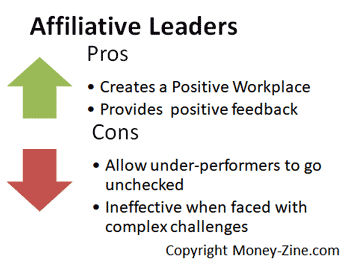The affiliative leader was first described by Daniel Goleman in conjunction with the six leadership styles defined in his theory of Emotional Intelligence. As described by Goleman, affiliative leaders can be summarized as individuals that are often more sensitive to the value of people than reaching goals. Affiliative leaders take pride in their ability to keep employees happy, and create a harmonious work environment. These leaders attempt to build strong relationships with those being led, with the hope that these relationships will bring about a strong sense of loyalty in their followers.
Affiliative Leadership Effectiveness
| Additional Resources |
| Autocratic LeadershipAuthoritative Leaders Charismatic Leaders Coaching Leadership |
The affiliative leader is a master at building relationships. This leadership style is most effective when there is a need to mend bad feelings that may have developed in a group, or to motivate others during times of heavy workload and stress. As expressed by Goleman, the affiliative leader is best described by the phrase "people come first."
Pros and Cons of Affiliative Leadership
While working for this type of manager might sound promising, this leadership style does have its limits. Mediocre results may quickly follow if this is the only style used. It's advisable to use the affiliative leadership style in conjunction with one that focuses on achieving business results too.
Pros
Studies conducted by Hay / McBer examined the observations of thousands of executives trying to understand their behaviors, and their impact on the work environment. This team wanted to better understand how a particular leadership approach influences their direct reports. The findings of this study indicate that the affiliative leader has the second most positive impact of all styles, trailing behind the authoritative leadership style. Both styles are very effective in creating a positive and upbeat place to work. Affiliative leaders also provide their followers with plenty of positive feedback. They are quick to recognize the efforts of others, and provide rewards for a job well done. They build a sense of belonging among team members, and are extremely effective at "patching things up" between members of the team.
Cons
As was the case with the authoritative leadership style, the affiliative style is not one that a leader will want to practice all the time. While affiliative leaders are great at providing positive feedback and motivating team members, they often shy away from dealing with under-performing members of the team.

Since poor performance can go unchecked in the team, some employees might get the impression that mediocre performance is good enough. This can lead to a rapid deterioration in overall team performance. Affiliative leaders are also ineffective when the team is faced with complex challenges. In fact, because the leader provides strictly positive feedback, they can inadvertently motivate their followers to continue down the wrong path. As is the case with other styles, the pros and cons demonstrate the need to master several situational leadership™ skills. An effective leader will practice multiple styles, and know when it's appropriate to stop or start using a particular style.
Examples of Affiliative Leaders
It should be easy for anyone that has worked for a number of years to remember a manager that provides a good example of an affiliative leader. They were upbeat, took coworkers to lunch, remembered all of life's special events, and were always telling their direct reports what a good job they were doing.
Joe Torre
The classic example of an affiliative leader, and the one often cited by Goleman, is Joe Torre, the ex-manager of the New York Yankees. Just think about the challenges faced by the manager of a professional baseball team; and the New York Yankees are not just any team. Joe Torre was the manager of one of the most talented teams in all of baseball. With all of that talent in one place, there are going to be many ego-centric players to deal with too. In this setting, perhaps one of the greatest accomplishments of a manager is simply holding the team together, and building a sense of harmony among teammates. This is a skill that affiliative leaders master, and so has Joe Torre. Joe was quick to recognize the contributions of individual players, and express his gratitude for the results in the Win / Loss columns. By examining his many positive statements in the press, and how well he treated his players, it's easy to understand how effective an affiliative leader can be in the right setting.
About the Author - Affiliative Leaders


